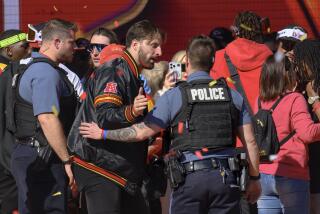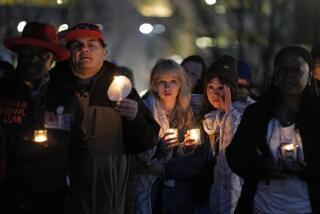Missouri governor says violence won’t be tolerated after Ferguson grand jury ruling
- Share via
While the St. Louis area remains on edge awaiting a grand jury decision in the shooting death of an unarmed black teenager by a white police officer in Ferguson, Mo., local law enforcement and activists are preparing for protests that could potentially spawn violence.
Missouri Governor Jay Nixon said on Tuesday violence will not be tolerated in any protests.
Nixon said he would bring in police from around the state and have the National Guard on stand-by for the grand jury decision that is likely to come in mid to late November.
“That ugliness was not representative of Missouri and it cannot be repeated,” Nixon said at a news conference.
“The National Guard has been and will continue to be part of our contingency planning,” he said, adding that the state will work to keep people safe.
A grand jury decision on whether Ferguson Police Officer Darren Wilson should face charges in the Aug. 9 shooting death of Michael Brown, 18, is expected in the coming weeks. Wilson, who is white, shot the black teenager six times in a confrontation on a street in Ferguson, according to a preliminary private autopsy.
Rumors of an impending decision on the indictment have flooded social media for days, prompting St. Louis County Prosecuting Attorney Robert McCulloch on Monday to reiterate his expectation that the grand jury would not make a decision until mid-to-late November.
McCulloch, whose prosecutors have been presenting evidence to the grand jury, said his office would advise the public when a determination has been made.
Nixon said that over 1,000 area law enforcement officers have had 5,000 hours of training to prepare for the upcoming protests.
The St. Louis County Police Department has spent about $120,000 to replenish equipment such as shields, batons, tear gas and flex handcuffs after weeks of unrest in the aftermath of the shooting depleted supplies and damaged equipment.
“Obviously we don’t want to use this equipment,” said St. Louis County Police Sgt. Brian Schellman. “But we have an obligation to preserve life and property.... As police it’s our job to prepare for the worst, but hope for the best.”
St. Louis County police, along with the Missouri Highway Patrol and St. Louis Metropolitan Police, have been meeting daily since October in anticipation of the decision, Schellman said. Phone calls and emails to the Highway Patrol and metropolitan police about any additional riot gear purchases were not immediately returned Tuesday.
“These are tactical and strategic meetings,” said Schellman, noting that small protests outside the Ferguson Police Department have taken place almost nightly for much of the last two months.
COMMUNITY PREPARES
Community members are also preparing for protests that could turn violent by holding forums so people are aware of their rights and can get legal training. Hundreds of people in Ferguson were arrested during the August protests.
“We want activists to understand their boundaries of legal protests and know the risks associated with civil disobedience,” said Andy Stepanian, a spokesman with HandsUpUnited.org, a group that formed after Brown’s death. Stepanian said the group, in conjunction with National Lawyers Guild and American Civil Liberties Union, have held about about two dozen training sessions in the last month.
St. Louis area activists at midday on Tuesday conducted training for legal observation, non-violent protest techniques and street first aid treatment in anticipation of demonstrations that could follow if the grand jury does not vote charges against Wilson.
The National Lawyers Guild and American Civil Liberties Union are assisting in the training of protesters, who have sought to negotiate terms of engagement with law enforcement for demonstrations.
Shortly after Wilson killed Brown, there was looting and vandalism of some Ferguson businesses, as well as clashes with police. The protests over Brown’s death have since been mostly peaceful as the grand jury decision is awaited.
Some businesses have boarded up windows and made plans for how to protect themselves and their property if protests ignite into violence and destruction.
The Ferguson-Florissant School District, which had to delay the start of the school year due to protests in August, has reviewed contingency plans in case there are serious protests and schools have to dismiss students early for safety reasons.
Jana Shortt, director of communications for the school district, said parents have been asked to update their contact information and to make sure they have authorized people to pick up their children, if they are let out early.
GRAND JURY
Several leaks surrounding the grand jury investigation have emerged in recent weeks, including some that indicate several witnesses offered testimony that supports Wilson’s account that he was defending himself from Brown. The U.S. Department of Justice condemned the disclosures as “irresponsible and highly troubling.” Moreover, the Justice Department is conducting its own civil rights investigation into the Ferguson Police Department.
If the grand jury does not indict Wilson, St. Louis County Prosecutor Robert McCulloch has vowed to release full transcripts and audio recordings of the proceedings.
Rumors of an impending announcement have flooded social media for days, prompting St. Louis County Prosecuting Attorney Robert McCulloch on Monday to reiterate his expectation that the grand jury would not make a decision until mid-to-late November.
McCulloch, whose prosecutors have been presenting evidence to the grand jury, said his office would advise the public when a determination has been made.
There is widespread expectation the grand jury will not indict Wilson.
Los Angeles Times, Reuters contributed to this report.
More to Read
Sign up for Essential California
The most important California stories and recommendations in your inbox every morning.
You may occasionally receive promotional content from the Los Angeles Times.













